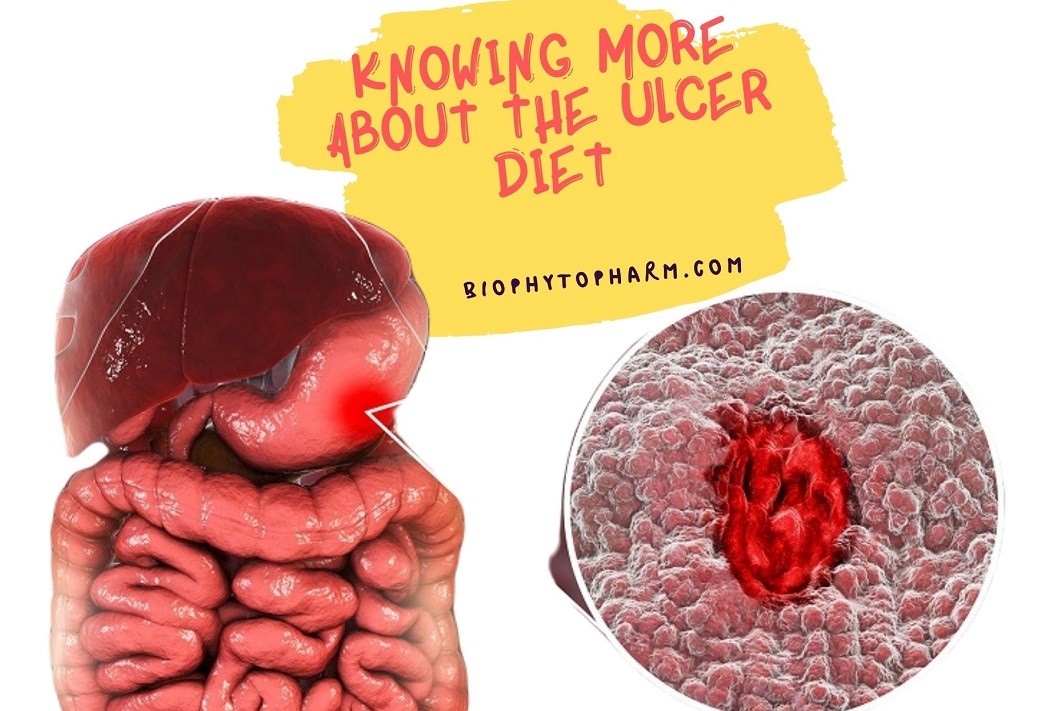Knowing More About the Ulcer Diet

What is an Ulcer?
An ulcer is a sore, but it is not on the outside of the body. It is usually around an inch or two inches long and it is located in the lining of the stomach. These are sometimes called gastric ulcers. However, an ulcer can also be situated at the beginning of the small intestine, which is called the duodenum, or in the esophagus. These are referred to as duodenal and esophageal ulcers, respectively.
The most common term used to describe any type of stomach or duodenum ulcer is peptic ulcer. What happens is that the stomach starts the digestive process by mashing the food you eat and mixing it with pepsin and hydrochloric acid. If there is damage or a hole where these acids can enter the stomach lining, they get inside of it making a sore, and every time you eat an acidic food they make the hole larger.
An ulcer is painful, particularly when acid is abundant in the stomach. If you have an ulcer and you let it go untreated, it can eat through the wall of the stomach and enter blood vessels. This is called a bleeding ulcer. If the ulcer completely eats through the wall of the stomach and then bacteria and inflammation set in, you could get very ill and even die. This is known as a perforated ulcer.
Other Definition Of Stomach Ulcer
Any stomach ulcer is very debilitating in addition to a potentially fatal disease. Stomach ulcers come in simple fact divots in the stomach filling, creating extreme agony in addition to central hemorrhage. When un-mended, that pin may feel stomach-filling, in addition, to making it possible for it to have the corrosive belongings vacation into the around the muscle. For a long period, it was a notion that spicy meals, the stress in addition to drinking will be the key elements resulting in stomach ulcers. Nonetheless, and also the good progress in medication in addition to technologies, right now most people know that contrary to popular belief, an ulcer is not due to spicy meals.
That treatment for a good ulcer in the past century had not been exactly skyrocketed science: bed relaxation, any dreary eating habits in addition to antacids. Nonetheless, these kinds of cures only reduced that distress, even so, the final results were commonly not long-lasting. Once that treatment ended, that agony returned. A recent investigation demonstrated that spicy meals and stress in addition to drinking may get worse than indicators of your stomach ulcer, nonetheless usually do not bring about the idea.
Almost all stomach ulcers are due to any bacterial infection in the stomach filling. Even though bed relaxation and any dreary eating habits in addition to antacids may relieve that indicator, antibiotics stop ulcers by eliminating the bacteria within four week period as well as not one but two treatments.
The bacteria that has plenty of ulcers is named Helicobacter pylori, and also the Foreign investigators which found the idea in 1982 gained that Nobel Reward within Medication because of this. Before this specific breakthrough, it was notion unattainable for any bacteria to pull through that acid solution conditions in the human stomach. Nonetheless, not all people with all the bacteria produce ulcers, only TWELVE to 15%. May found that most men and women within produced locations, in addition to everyone, use some regions of everything containing the bacteria of their tummies, nonetheless, it is still unidentified the key reason why a lot of people acquire these kinds of indicators regarding infectious while others never. Well, this specific infectious using Helio bacter pylori gets going within childhood in addition to proceeds for life.
Causes Of An Ulcer
While originally it was believed that lifestyle was the major cause of an ulcer, that is no longer the case. While alcohol and stress can still affect the condition of an ulcer, it is bacteria that originally causes the ulcer. In particular, Helicobacter pylori, or H. pylori as it is more commonly known is the bacterium that causes an ulcer.
Scientists believe that it is the spiral shape of H. pylori that allows it to enter the stomach, where it then attaches itself to the stomach wall. The bacterium creates an enzyme called urease, which produces ammonia. The ammonia causes the mucous on the stomach wall to be damaged to the point that stomach acid can enter and create an ulcer.
While it is this form of bacteria which causes an ulcer, other lifestyle factors do contribute to the ulcer’s development. These include the use of alcohol, nicotine, caffeine, stress, and NSAIDs (non-steroidal anti-inflammatory drugs). These include aspirin, naproxen, ibuprofen, and piroxicam. These lower the stomach’s built-in preventative measures, such as being able to produce bicarbonate and mucus which can lessen the strength of stomach acid.
Symptoms of an Ulcer
Ulcers can take several years to develop and there can be a long period when there are no symptoms of an ulcer at all. As the ulcer grows and gets worse, symptoms start to develop, such as a burning-type pain in the abdomen. Lots of times people wake up in the middle of the night with this type of burning sensation.
The burning feeling will undoubtedly be followed by feeling sick to the stomach or nauseous after eating a meal. If you don’t go to your doctor for diagnosis (x-rays or testing for H. pylori), these symptoms will worsen to the point where you feel weak and fatigued all the time. It may be followed by blood in the stools.
Most ulcers are treated with an ulcer diet and medicines but sometimes surgery is needed. Your doctor will urge you to make lifestyle changes, such as quitting smoking, abstaining from alcohol and drinks with caffeine, and sticking to an ulcer diet. That usually means no spicy foods as well. H-2 blockers are usually given to decrease the amount of acid in your stomach. The most well-known of these are Zantac ™, Tagamet™, and Pepcid™.
There are now proton-pump inhibitors, such as Prilosec™, that are even more effective in reducing the amount of acid in the stomach–up to 95%. Some medications protect the stomach lining from acids, such as over-the-counter Pepto-Bismol, Tums™, and Rolaids™, and prescription drugs like Sulcrate™, Carafate™, and Cytotec. These are ineffective if the ulcer continues to grow and many times antibiotics are given.
If you do think you are developing an ulcer, see your doctor right away. Early treatment methods, such as antibiotics and an ulcer diet can keep your ulcer from becoming a serious, life-threatening condition.
Stomach Ulcer Diet
When you have an ulcer, your doctor will most likely recommend an ulcer diet to help keep your condition from worsening. Everyone’s stomach is different so you might have to experiment at first with different foods to figure out the best ulcer diet for you. Generally speaking, eating hot, spicy foods will cause an ulcer to act up, while bland foods are key to the least stomach problems.
An ulcer diet can be used by anyone with stomach problems. Whether you already have an ulcer or are developing an ulcer, or you have trouble with gas or nausea, you should give a new diet a try to see if you can eliminate some of the discomforts and avoid needing surgery to correct the problem.
The key to an ulcer diet is not just eating bland foods, but also eating the right amounts in each of the food groups so that you have a balanced diet. Unlike diabetics who are encouraged to eat as many as six small meals every day, people who have ulcers should not eat more than three. That’s because every time you eat, acid is produced in your stomach, and acid is what makes your ulcer act up.
Many people believe that milk can help an ulcer and so they consume a higher amount of milk and dairy products than normal. This thinking is a fallacy. Milk increases the amount of acid in your stomach which is exactly what an ulcer diet is trying to decrease. Up to three servings of milk each day are okay as long as you drink low-fat or no-fat milk. Fat also increases stomach acids.
Ulcers are a very common problem so many people know the basics of an ulcer diet from talking with friends and relatives who have an ulcer. An ulcer diet consists of no hot peppers, red or black peppers, hot chili, or foods flavored with chili powder. Alcohol is a no-no, as are any foods with caffeine, whether it be coffee, colas, teas, or chocolate. Those new high-energy sports drinks that can have over 300 mg of caffeine could be particularly dangerous to people with ulcers.
Any very acidic food should be limited or eliminated from an ulcer diet. At the top of the food list for ulcers are tomatoes and tomato products, orange or grapefruit juices, and fatty meats. Unfortunately, the very foods recommended for a healthy, nutritious diet can cause stomach pain for people who have ulcers. This includes whole grains, peas, most types of beans, and fruits with peels. Most of the vitamins are in the peels of fruit–an apple is a great example, so if you do have an ulcer or other stomach problems that preclude eating fruit peels, you will want to make sure you are getting enough vitamins and minerals even if it means taking a supplement.
Sometimes vegetables in the cabbage and broccoli family are off-limits for people with ulcers. So are onions. With all of these foods, you need to see how much you can eat. Some people with ulcers can eat a limited amount of acidic foods while others cannot tolerate even minimal amounts. Drinks such as caffeine-free colas, apple juice, and a few milder herbal teas can be helpful.
An ulcer diet should have what is considered the normal amount of carbohydrates, which is six to ten servings per day. These are what are considered the blandest of foods such as dry cereal, bread, spaghetti, macaroni, or crackers. You can add to that berries, pears, apples, and other non-acidic fruits, along with low-fat milk and cheeses.
Turkey, chicken, and fish are excellent choices on an ulcer diet but you will want to stay away from foods like sausage or barbecue ribs. French fries are also bad ideas as are highly seasoned foods. Soups like lentils and tomatoes should be avoided but other soups, such as those with vegetables, are permissible.
The whole point of an ulcer diet is to limit stomach acids which will eat away at the ulcer. It usually just takes a little common sense to decide if a food might be good for your ulcer or not. For instance, horseradish is not going to cause a fun reaction and most nuts are not recommended. You also should not be ordering pizzas with toppings like pepperoni, sausage, onions, and peppers.





